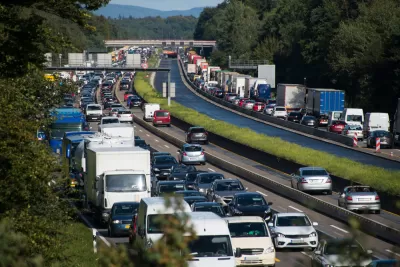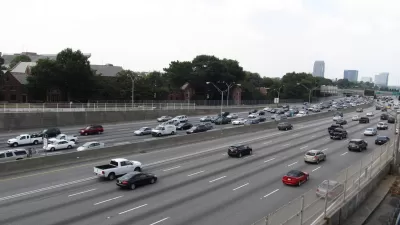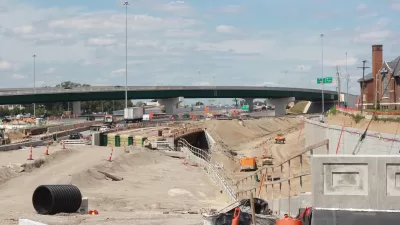Even if widening highways enough to relieve all congestion were possible, it would only benefit a very small number of commuters, according to new research.

"Urban planners should abandon their obsession with fighting congestion in favor of building more housing in traffic-choked cities because people who live in congested urban centers actually have better access to good jobs and economic opportunity," writes Angie Schmitt.
Schmitt arrives to that conclusion from data provided in a study by researchers from the University of California, Los Angeles, titled "Not so fast? Examining neighborhood-level effects of traffic congestion on job access" and published by the Transportation Research Part A journal.
The study examined the regions around San Francisco and Los Angeles, finding that "commuters who lived near uncongested highways on the fringes of the region couldn’t get to the best jobs faster than people living within the high-traffic areas."
Schmitt provides more detail from the study, while also sending a message to all the state departments of transportation laboring in an effort to built regional automobile transportation systems out of congestion:
Even if congestion could be dramatically improved across the Bay Area, the authors found, the effects on job access would be relatively minor. As frustrating as congestion is to drivers, only 5 to 12 percent of the region’s residents would see an “appreciable” increase in job access if congestion was essentially eliminated, the job access models the team created showed. That, practically speaking, would be impossible or cost prohibitive to accomplish anyway.
FULL STORY: Lack of Housing Is Hurting Urban Workers Far More Than Congestion

Alabama: Trump Terminates Settlements for Black Communities Harmed By Raw Sewage
Trump deemed the landmark civil rights agreement “illegal DEI and environmental justice policy.”

Study: Maui’s Plan to Convert Vacation Rentals to Long-Term Housing Could Cause Nearly $1 Billion Economic Loss
The plan would reduce visitor accommodation by 25% resulting in 1,900 jobs lost.

Why Should We Subsidize Public Transportation?
Many public transit agencies face financial stress due to rising costs, declining fare revenue, and declining subsidies. Transit advocates must provide a strong business case for increasing public transit funding.

Paris Bike Boom Leads to Steep Drop in Air Pollution
The French city’s air quality has improved dramatically in the past 20 years, coinciding with a growth in cycling.

Why Housing Costs More to Build in California Than in Texas
Hard costs like labor and materials combined with ‘soft’ costs such as permitting make building in the San Francisco Bay Area almost three times as costly as in Texas cities.

San Diego County Sees a Rise in Urban Coyotes
San Diego County experiences a rise in urban coyotes, as sightings become prevalent throughout its urban neighbourhoods and surrounding areas.
Urban Design for Planners 1: Software Tools
This six-course series explores essential urban design concepts using open source software and equips planners with the tools they need to participate fully in the urban design process.
Planning for Universal Design
Learn the tools for implementing Universal Design in planning regulations.
Smith Gee Studio
Alamo Area Metropolitan Planning Organization
City of Santa Clarita
Institute for Housing and Urban Development Studies (IHS)
City of Grandview
Harvard GSD Executive Education
Toledo-Lucas County Plan Commissions
Salt Lake City
NYU Wagner Graduate School of Public Service





























